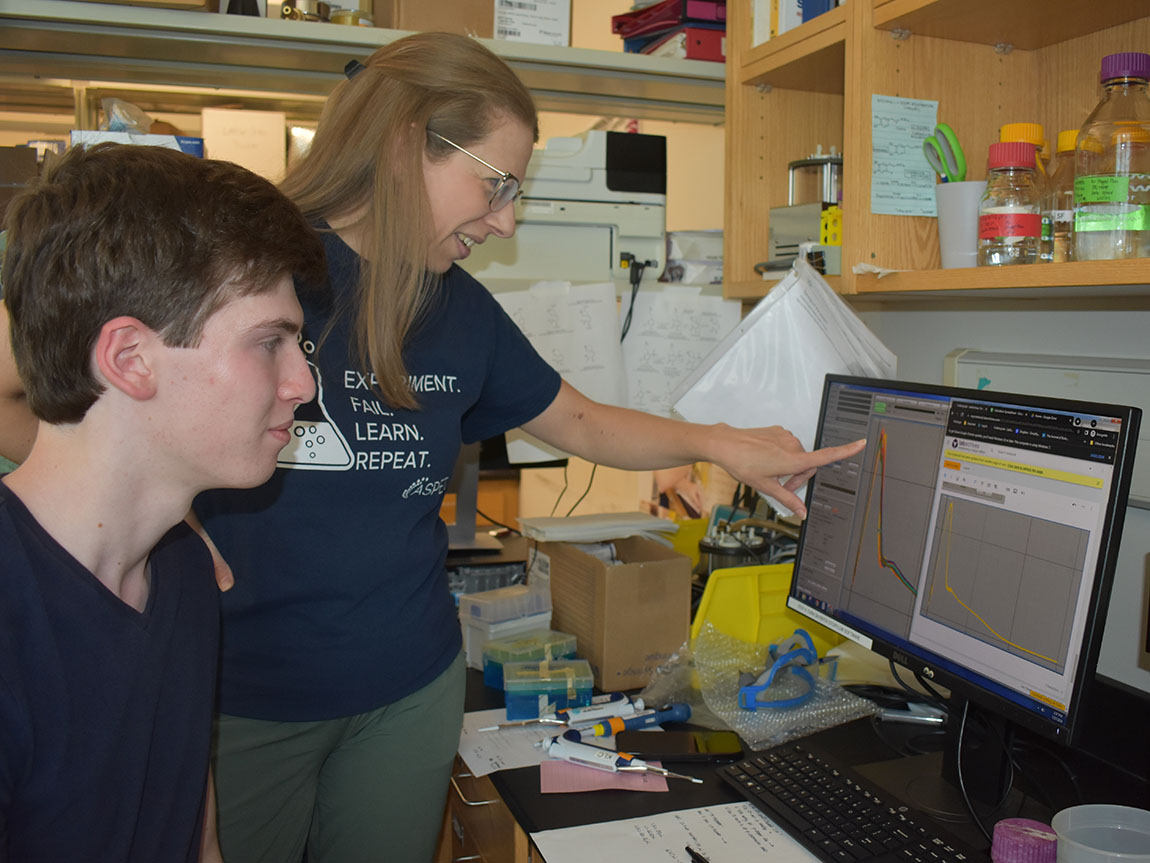Muhlenberg Receives $315,000 National Science Foundation Grant to Support Chemistry Chair’s Research
This is the second time Professor of Chemistry Keri Colabroy’s project, which has involved 60 Muhlenberg student collaborators since it began in 2017, received NSF funding.By: Meghan Kita Thursday, September 25, 2025 10:17 AM
.jpg) Colabroy’s student research group in summer 2025. Photo by Joe Romano '23
Colabroy’s student research group in summer 2025. Photo by Joe Romano '23In July, Professor and Chair of Chemistry Keri Colabroy learned that the National Science Foundation (NSF) had granted $315,000 to Muhlenberg to support her research, which launched with the help of a $294,000 NSF grant in 2017. The project, a collaboration with Rhodes College Professor and Chair of Chemistry Larryn Peterson, is about turning carbon from natural sources, like tree bark, into useful materials, like antibiotics, using powerful enzymes called dioxygenases.
“The class of enzymes that we were investigating, they are the only enzymes of their kind that make antibiotics. Over 80% of the antibiotics that are currently being used in the clinic have a natural origin, meaning they come from nature. If we're going to get more antibiotics, nature is very likely to be the source of them,” says Colabroy.
Jon Cohen ’25 and Colabroy in her lab during summer 2024
Enzymes take molecules and reconfigure them, but to make new antibiotics, you need new molecules and new enzymes. You also need to understand why and how the enzymes do what they do. This is what the first part of the project focused on — finding new molecules and enzymes and understanding how the enzymes work.
“Now we’re wondering, ‘How can we make this enzyme work better?’” Colabroy says. “We have some hypotheses, but we need more money [this NSF grant] in order to actually test those hypotheses.”
“I think research is the best teaching I do. I have not observed any other method by which I see such profound transformation in students.”
—Professor and Chair of Chemistry Keri Colabroy
Muhlenberg is the lead institution on the grant, and Colabroy is the lead principal investigator. Muhlenberg’s award includes a subaward to SUNY Cortland Professor of Chemistry Katherine Hicks, a new collaborator who has expertise in protein structure. Peterson received a $180,000 award, so the project’s total award is $495,000. All three faculty work at primarily undergraduate institutions, and the funding supports undergraduate research and integration of research into the curriculum.
Sixty Muhlenberg students have worked on the project since it began. Some of them came to the project through Experimental Biochemistry, a course that works on small pieces of the project during class time. Others have joined Colabroy’s lab, which works on the project more extensively during the academic year and over the summer. The research has resulted in five peer-reviewed publications, including one that was published in the journal ACS Omega in July, with 16 unique Muhlenberg student co-authors and more than a dozen presentations by Muhlenberg students at national meetings.
“I think research is the best teaching I do,” Colabroy says. “I have not observed any other method by which I see such profound transformation in students.”

